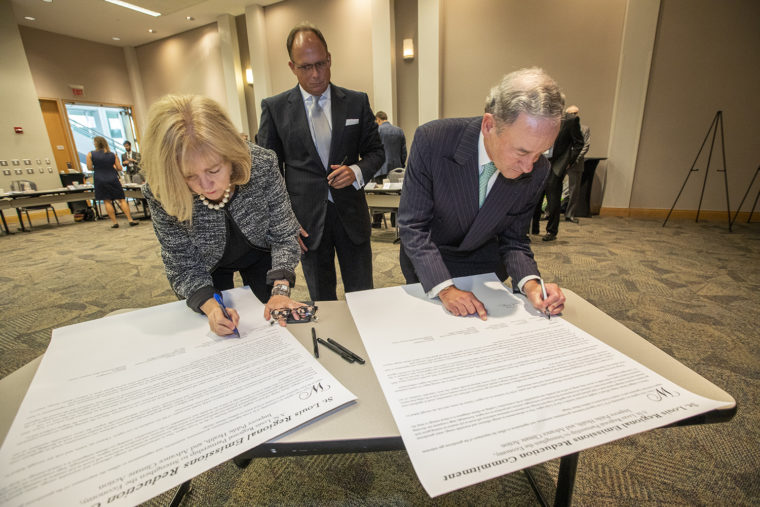Washington University in St. Louis is committed to being a national sustainability leader. Through cutting-edge education, research and practice, Washington University’s global community is accelerating the discovery and application of solutions to the great energy, environmental and sustainability challenges facing our planet. In addition, Washington University fosters broad partnerships with regional, national and international organizations to expand impact far beyond the campus.
The university’s recent inclusion in a newly-formed international environmental coalition and the release of a St. Louis regional proclamation on climate change demonstrate the depth of the university’s efforts.
Washington University has joined 16 other leading research universities that comprise the University Climate Change Coalition (UC3). UC3 is a new network of institutions from across North America formed on Feb. 6 at the 2018 Higher Education Climate Leadership Summit, committed to leveraging its combined institutional strength to foster a robust exchange of best practices and research agenda in pursuit of accelerating local climate solutions.
“Washington University recognizes that it is incumbent upon us, as a leading research institution, to help find solutions for the greatest challenges facing our planet,” Chancellor Mark S. Wrighton said. “That includes climate change. We are proud to participate in the UC3 cohort, so together we can lead by example and share best practices to bring about lasting and positive environmental change.”
Like Washington University, the other colleges and universities in UC3 are pursuing carbon neutrality in campus operations, creating new climate solutions through innovative research, and preparing students to solve the urgent climate challenges of the 21st century. UC3 was built on this work and the vision of higher education institutions taking a leading role in climate action by leveraging strengths of research institutions.
As part of its commitment to UC3, Washington University held a cross-sector climate change forum that included corporate entities, nonprofit leadership and government officials. The goal: to convene a variety of leading St. Louis organizations to discuss best practices and opportunities to collaborate for a greener, cleaner region for all.
Held Aug. 28 on the campus of Washington University School of Medicine in St. Louis, the session was convened by Wrighton along with St. Louis Mayor Lyda Krewson; Michael L. Moehn, chairman and president of Ameren Missouri; James C. Carrington, president of the Danforth Plant Science Center; and Mark C. Darrell, senior vice president, general counsel and chief compliance officer of Spire Inc.
Nearly 30 government, nonprofit, corporate and public sector leaders shared their current efforts to mitigate and adapt to climate change, and through a series of facilitated discussions, identified ways they might work together to benefit the St. Louis region and accelerate climate action. Key discussion topics included building energy efficiency, the transportation sector and energy sources.
“The regional targets of reducing greenhouse gas emissions 28 percent by 2025 and 80 percent by 2050 align with those outlined by the city in its Climate Action & Adaptation Plan,” Krewson said. “Moreover, these targets are consistent with the global vision outlined during the Paris Accord, and which I have endorsed through different leadership groups including Climate Mayors, We Are Still In and the Global Covenant of Mayors for Climate & Energy.”
A key outcome of the forum is the release of a shared proclamation, in which organizations agreed to endorse regional greenhouse gas reduction targets of 28 percent reduction below 2005 levels by 2025, and 80 percent reduction below 2005 levels by 2050.
Signatories also agreed to adopt, publish and begin efforts to achieve specific greenhouse gas reduction targets for their own institutions, businesses, governments and organizations that contribute to the regional goal within one year of signing the letter, if they do not already have an organizational goal. Twenty organizations are initial signers; additional commitments are expected in the coming weeks.
The initial signatories invite other St. Louis regional businesses, governments, institutions, and organizations to join them in signing the proclamation. To view the proclamation, click here. For more information, contact Phil Valko, assistant vice chancellor for sustainability at Washington University.
